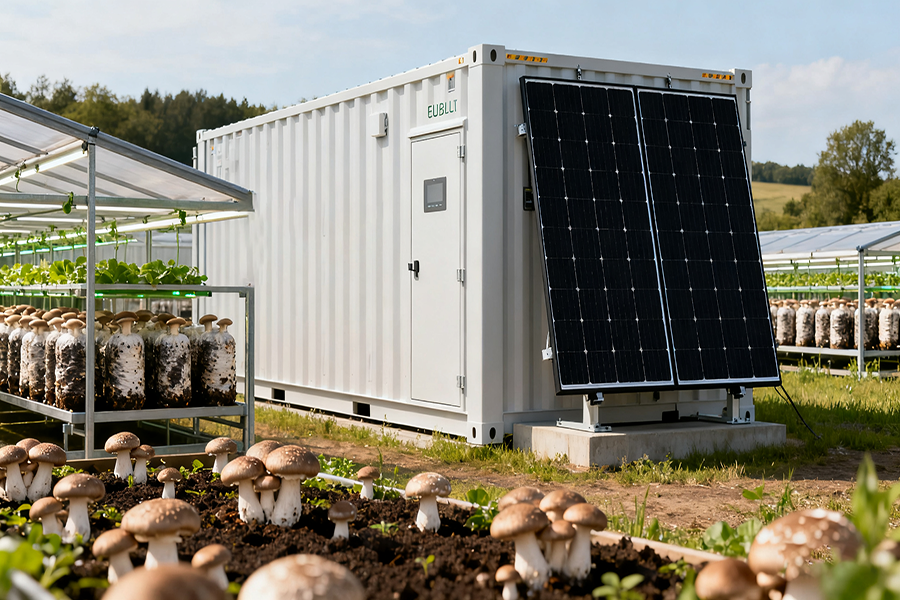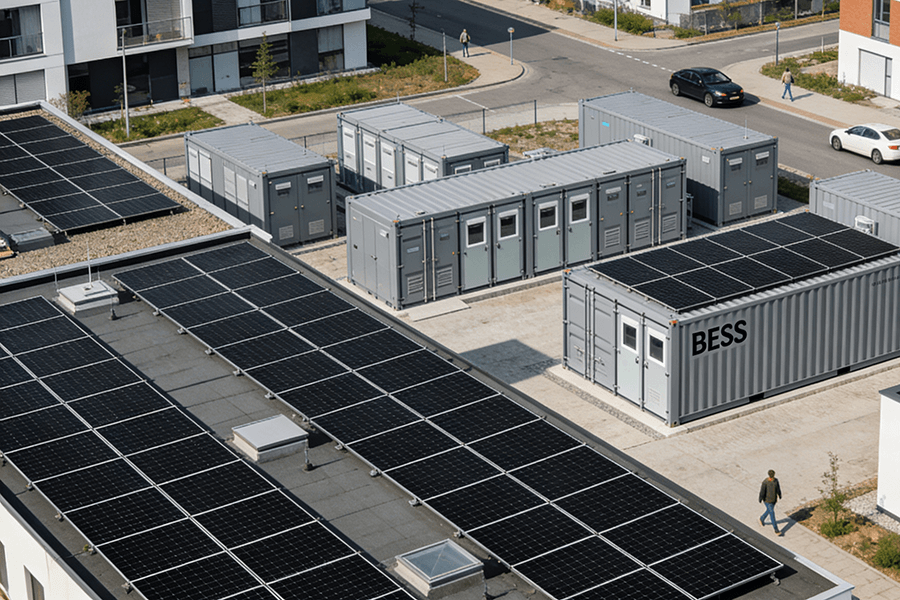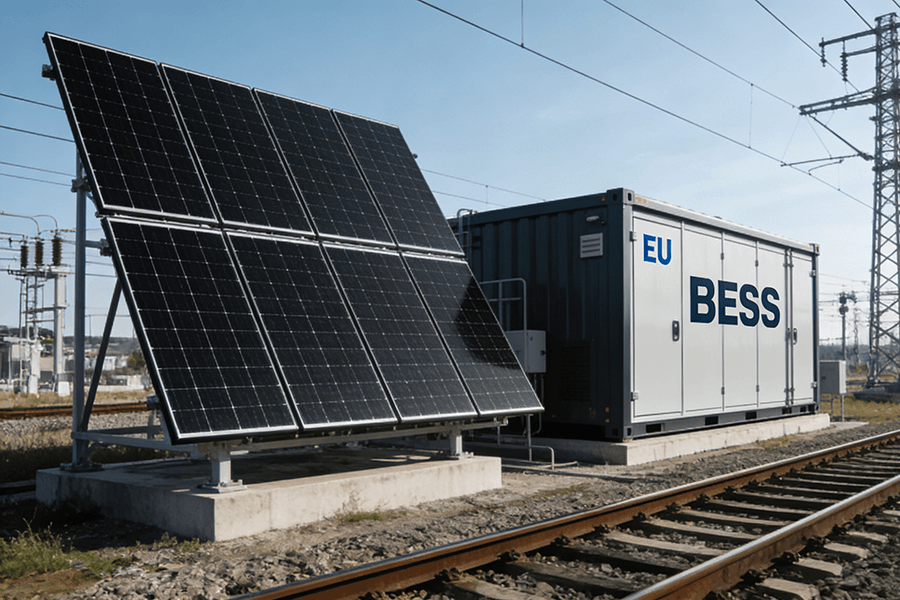
Why BESS Containers Are Non-Negotiable for EU Mushroom Farms
The EU’s “From Farm to Fork” strategy isn’t just a policy—it’s a deadline. By 2030, specialty crop farms (including mushroom operations) must source 25% of their energy from renewables (source: EU Farm to Fork Strategy). For mushroom growers, this mandate comes with a unique challenge: mushrooms are extremely picky about their environment.
Unlike crops that tolerate slight temperature or humidity swings, mushrooms require:
- A constant temperature of 18–22°C (64–72°F) for mycelium growth
- 85–95% humidity to prevent drying out
- 24/7 ventilation to remove CO₂ and bring in fresh oxygen
Solar power is a great renewable option, but it’s like a part-time employee—it only works when the sun is up. This is where BESS (Battery Energy Storage System) Containers step in: they store solar energy during the day and release it at night or on cloudy days, ensuring the farm’s climate control systems never skip a beat. Without BESS, meeting the EU’s renewable mandate while keeping mushrooms happy is nearly impossible.
Humidity-Resistant BESS Units: Built for Mushroom Farms’ “Tropical” Conditions
Mushroom farms are humid—think rainforest-level moisture. Standard battery systems would rust or short-circuit within months. That’s why BESS units for mushroom farms need specialized design.
Technical Specs of Mushroom-Focused BESS Units
The unique environmental demands of mushroom cultivation necessitate a meticulous approach to BESS unit engineering. Below is a detailed breakdown of the critical technical specifications tailored for mushroom farms:
| Feature | Specification | Purpose |
|---|---|---|
| Energy Capacity | 20–50 kWh | Powers 8–12 hours of climate control (fans, humidifiers, heaters) during off-solar hours |
| Enclosure Rating | IP67 | Protects against dust, water splashes, and temporary submersion (critical for humid farms) |
| Component Material | Corrosion-free aluminum/glass-reinforced plastic | Prevents rust from constant moisture (extends unit lifespan to 10–15 years) |
| Cooling System | Passive ventilation (no fans) | Avoids adding dry air to the farm (which would disrupt humidity levels) |
| Temperature Tolerance | -10°C to 50°C | Ensures optimal battery performance within the temperature fluctuations typical of mushroom growing environments |
| Safety Features | Overcharge/overdischarge protection, short-circuit prevention | Minimizes risks in a high-moisture setting, safeguarding both equipment and crop |
According to Polycase, a leading enclosure manufacturer, IP67-rated enclosures offer robust protection. They can withstand being submerged in 1 meter of water for 30 minutes—far exceeding the protection needed to counteract the daily humidity challenges in mushroom farms (source: Polycase IP67 Enclosures). This level of durability ensures the BESS units maintain functionality over extended periods, reducing maintenance costs and downtime for farmers.
Pairing BESS with Solar Arrays: The 65% Self-Sufficiency Win
BESS units don’t operate in isolation; they integrate seamlessly with 10–30 kW solar arrays, an ideal capacity range for small-to-medium EU mushroom farms (ranging from 500–2,000 m²). This symbiotic relationship unlocks multiple benefits:
Energy Autonomy and Cost Savings
The synergy between solar panels and BESS creates a resilient energy ecosystem. By storing surplus solar energy during peak daylight hours, farms can rely on this reserve during nighttime or cloudy periods, achieving up to 65% self-sufficiency. This translates to significant cost savings, slashing grid electricity expenses by approximately €0.15/kWh—the average EU industrial rate.
Winter Heating Efficiency
During the colder months, when mushroom farms typically rely on natural gas for heating, the solar+BESS combination proves especially advantageous. By leveraging stored solar energy, farms can reduce their natural gas consumption by up to 50%. For a 1,000 m² farm, this equates to monthly savings of around €1,200, making the system a strategic investment for long-term financial sustainability.
Real-World Impact
Example: A 1,500 m² mushroom farm in Poland installed a 25 kW solar array + 40 kWh BESS. In its first year, it cut grid energy bills by €8,700 and natural gas costs by €7,200. This case study exemplifies how the solar-BESS integration not only drives down operational costs but also positions mushroom farms as environmentally conscious enterprises, aligning with the EU’s renewable energy goals.
The financial implications of this technology adoption are further illustrated in the table below, comparing annual energy costs before and after the implementation of solar+BESS systems for different farm sizes:
| Farm Size (m²) | Pre-Implementation Annual Cost (€) | Post-Implementation Annual Cost (€) | Savings (€) |
|---|---|---|---|
| 500 | 12.000 | 5,400 | 6,600 |
| 1,000 | 24,000 | 10,800 | 13,200 |
| 2,000 | 48,000 | 21,600 | 26,400 |
These figures underscore the transformative potential of solar-BESS solutions for mushroom farms across the EU, offering a clear pathway to both economic efficiency and environmental stewardship.
Load Matching: Keeping Mushrooms Happy 24/7
Mushroom farms operate around the clock, and a consistent power supply is essential for their smooth functioning. Load matching, which involves aligning energy supply with demand, plays a crucial role here. By implementing load matching, Battery Energy Storage Systems (BESS) ensure that critical equipment such as fans and humidifiers never experience unexpected shutdowns, safeguarding the delicate growing environment of mushrooms.
How BESS Handles Off-Peak Solar Hours
The availability of solar energy follows a distinct pattern, typically peaking between 10 AM and 3 PM. However, mushroom farms have a continuous energy demand that doesn’t align with solar availability. Let’s break down the daily energy consumption patterns of a mushroom farm:
| Time Slot | Activity | Energy Requirement |
|---|---|---|
| 5 AM–8 AM | Humidifiers ramp up after the cool night hours to maintain optimal humidity levels for mushroom growth | High, as humidifiers consume significant power to increase moisture in the growing environment |
| 9 PM–12 AM | Ventilation systems run for extended periods due to higher CO₂ buildup from nighttime mushroom growth, which needs to be regulated for healthy development | High, as the ventilation systems work continuously to exchange air |
BESS effectively addresses this mismatch through a two-step process:
- Charging Phase: During the solar peak hours (10 AM–3 PM), when solar energy production exceeds the farm’s immediate needs, BESS charges its batteries. This process stores the excess solar energy for later use, preventing it from going to waste.
- Discharging Phase: When solar energy is scarce, specifically during the off-peak times of 5–8 AM and 9 PM–12 AM, BESS discharges the stored energy. This power is then used to operate critical equipment like humidifiers and ventilation systems, ensuring the farm’s operations continue uninterrupted.
This load-matching functionality of BESS can be analogized to how C.H. Robinson uses AI to match truck loads with demand. Just as C.H. Robinson’s AI system optimizes logistics by pairing available truck space with shipping needs, BESS utilizes straightforward energy management software to “match” stored power with the specific energy requirements of the mushroom farm (source: C.H. Robinson Load Matching).
Aligning with EU Organic Mushroom Standards
In the European Union, obtaining organic mushroom certification under EC Regulation 834/2007 comes with stringent requirements, one of which is minimizing the environmental impact of farming operations. The integration of solar power systems with BESS offers a dual advantage that aligns perfectly with these standards:
- Carbon Footprint Reduction: By relying on solar energy stored in BESS instead of grid electricity, mushroom farms can significantly cut down on their CO₂ emissions. For a 1,000 m² farm, this combination can reduce CO₂ emissions by approximately 3.2 tons per year. This substantial reduction contributes to a more sustainable and eco-friendly farming practice.
- Avoidance of Fossil Fuel-Derived Grid Electricity: Many EU grids still rely on coal and gas for 30–40% of their power generation. By using solar+BESS, mushroom farms can avoid drawing electricity from these fossil fuel-dependent grids, further reducing their environmental footprint and promoting clean energy use.
Market Advantage: It’s worth noting that organic mushrooms command a higher price in the EU market. On average, organic mushrooms sell for 20–30% more than their conventional counterparts. For instance, the market price for organic mushrooms is around €5.50 per kilogram, compared to €4.20 per kilogram for conventional ones. By adopting solar+BESS systems, mushroom farms not only meet the environmental criteria for organic certification but also position themselves to take advantage of this price premium, enhancing their profitability.
ROI & EU Grants: Making BESS Affordable
The biggest question for farmers: When will I get my money back? This query lies at the heart of every investment decision, especially for capital-intensive projects like integrating Battery Energy Storage Systems (BESS) into mushroom cultivation. The financial viability of adopting solar+BESS technology becomes clear when analyzed through a detailed cost-benefit lens.
4-Year Payback: The Numbers Don’t Lie
For a 1,000 m² mushroom farm, a standard solar+BESS setup—comprising a 20 kW solar array paired with a 30 kWh BESS—commands an investment of approximately €35,000. This capital expenditure is offset by significant long-term savings, which we’ll break down in the table below:
| Cost Type | Annual Savings | Explanation |
|---|---|---|
| Grid Electricity | €5,400 | 65% reduction from the previous annual grid electricity bill of €8,300. |
| Natural Gas (Heating) | €7,200 | 50% decrease from the annual natural gas heating costs of €14,400. |
| Total Annual Savings | €12,600 | Cumulative savings across energy sources, showcasing the system’s efficiency. |
These annual savings translate into a payback period of roughly 4 years. Once this initial investment horizon is reached, the system becomes a profit-generating asset, injecting an additional €12,600 annually into the farm’s revenue stream.
To better understand the financial journey, here is a year-by-year breakdown of the cumulative savings and investment recovery:
| Year | Initial Investment (€) | Annual Savings (€) | Cumulative Savings (€) | Remaining Investment |
|---|---|---|---|---|
| 0 | 35,000 | 0 | 0 | 35,000 |
| 1 | 35,000 | 12,600 | 12,600 | 22,400 |
| 2 | 35,000 | 12,600 | 25,200 | 9,800 |
| 3 | 35,000 | 12,600 | 37,800 | -2,800 (profit achieved) |
| 4+ | – | 12,600 | – | – |
EAFRD Grants: Get EU Money to Fund Your BESS
The European Agricultural Fund for Rural Development (EAFRD) stands as a crucial ally for mushroom farmers looking to invest in BESS containers. This fund provides substantial grants specifically earmarked for specialty crop technologies, with BESS systems falling neatly within its purview. In most EU member states, these grants cover between 30–50% of the total system cost, making the technology even more accessible.
Application Process:
- Reach Out Locally: Contact your national agricultural agency. For example, German farmers should connect with the Bundesministerium für Ernährung und Landwirtschaft (BMEL), while their French counterparts can approach the Ministère de l’Agriculture et de la Transition agroécologique (MAPA).
- Utilize Online Resources: Leverage the EU’s Rural Development Portal to discover and apply for local programs tailored to your region.
By taking advantage of EAFRD grants, many farms have successfully reduced their upfront investment. A 50% grant on a €35,000 system, for instance, cuts the initial outlay to €17,500. This reduction in capital cost significantly shortens the payback period to just 2.2 years, accelerating the transition from investment to profit.
Maxbo Solar: Your EU Mushroom Farm’s Energy Partner
Maxbo Solar is committed to being more than just an energy solution provider—we’re your strategic partner in revolutionizing EU mushroom cultivation. Our end-to-end services span from initial consultation to long-term system optimization, ensuring that your BESS container and solar setup align seamlessly with the unique energy demands of climate-controlled mushroom farms.
Tailored Solutions for Sustainable Growth
Leveraging years of expertise in renewable energy integration, we design custom solar and BESS configurations that maximize energy efficiency while minimizing operational costs. Whether you’re a small-scale producer or a large commercial farm, our modular systems can be scaled to meet your specific requirements, providing a flexible and future-proof energy infrastructure.
Comprehensive Support and Maintenance
Our commitment doesn’t end with installation. Maxbo Solar offers ongoing technical support, regular system monitoring, and maintenance services to ensure your energy system operates at peak performance year-round. Our team of certified technicians is always on standby, ready to address any issues promptly and keep your mushroom cultivation process uninterrupted.
Join the Green Revolution in Mushroom Farming
By choosing Maxbo Solar as your energy partner, you’re not only investing in a sustainable future for your farm but also contributing to the EU’s ambitious climate goals. Embrace the power of solar energy and battery storage, and unlock the potential for greener, more cost-effective, and highly productive mushroom cultivation.
Contact us today to explore how Maxbo Solar can transform your EU mushroom farm with innovative, reliable, and eco-friendly energy solutions.






